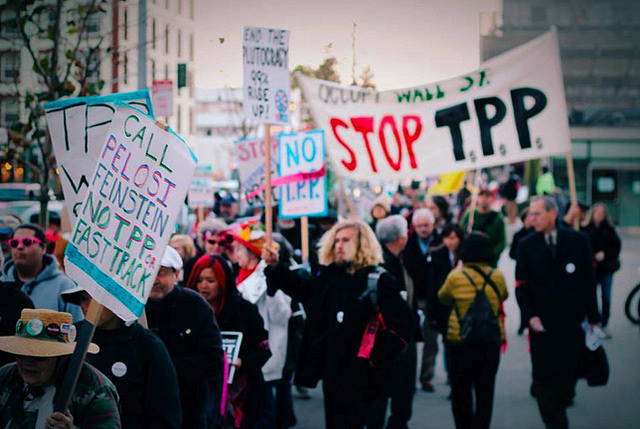A teenager who knows me too well says I’m obsessed with endlessly refighting the battle against free trade. That rings pathetically true. And now who wins a small victory over the ancient foe? Them. The U.S.! History is cruel.
It happened last week. President Barack Obama backed the latest in free trade, the Trans-Pacific Partnership — or TPP. The august Senate backed him. But the House of Representatives, the elected body nearest the people, voted No. It took a savvy, impassioned, grassroots campaign to make that happen and even so, it’s not over. Pro-free traders are already attempting a TPP resuscitation. Victories over free trade should be celebrated swiftly. But what explains even that hiccup?
Experience, I’d say. Free trade once got by on theory and jargon: It’s free, it’s trade — what could go wrong? Protection sounds so wussy. But now, decades on, there’s some reality to test it against. The U.S. economy has been hollowed out. Former well-paid industrial workers have become Walmart greeters, at best. Same thing here: experience. Why hasn’t the decline in energy prices and the Canadian dollar benefited Ontario’s economy? Because all those factories moved away due to free trade and we can’t seize the advantages dangling before us.
Along comes the TPP and people squint this time. Fool me once (or often). On inspection, it doesn’t look like it’s about trade at all. Most TPP nations have trade deals already. Japan doesn’t but its tariffs are tiny, hardly hindering trade. That was true between us and the U.S. in 1988, but we were blinded by the lingo. These should be called Not Free Trade deals. Then what’s the TPP about? Protection. I swear. For big pharma, Hollywood movies, music companies. They’ll charge more. They’ve tried to keep all that secret — thank God for WikiLeaks.
While revisiting the obsession, what other unlikely sources of insight might we tap? How about Greece? Are your eyes glazing over? What’s going on there? Its leader, Alexis Tsipras, says if the EU wins current battles, Greeks may as well skip elections. He says it’s about democracy and he does hail from Athens.
The EU is the oldest, tightest free trade zone around. Tsipras was elected to end austerity and preserve pensions and wage rates. Then the EU sends not elected politicians but accountants and number crunchers from central banks and other economic bodies to Athens to tell Tsipras he must cut those pensions and can’t do what he was elected to. If they win, he’s right: voting is pointless. This has gone on in the Third World for years, under that mouthful, “structural adjustment policies.” The only places to defy it were Argentina and Iceland (who survived). Now it’s slouching into the advanced world, via Greece. Which shows:
We were wrong when we thought the original battle over Canada-U.S. free trade was a replay of the War of 1812. It wasn’t about national independence, it was about democracy (though they’re related). It wasn’t Ronald Reagan who wanted to dictate to us; it was technocrats representing economic forces like banks and corporations. It’s true there are politicians like Angela Merkel behind the bossy technocrats and economists, but there are corporate paymasters behind the politicians, as we’ve learned through other sobering experiences.
Here’s the weird, entangled part. The more free trade and other economic globalizing forces advance, the more need there is for democratically responsive governments to rein them in. Yet they repel each other. This is the iron law of capitalist development. Left on their own, banks and corporations will maraud, it’s their nature. They require the counterforce of democracy to save them from themselves. (I steal shamelessly from Karl Polanyi, again.) How to resolve this? I don’t know, politics isn’t a science, despite political science departments. But people sometimes stumble toward solutions anyway, as in the U.S. last week.
Point final. The (not) free traders were right on one thing: growth has, er, grown, under their dogmas. Statistically. But distribution has been wretchedly unjust and most people’s lives have stagnated or diminished. If you’re prepared to martyr yourself and future generations on the altar of rising GDP, end of discussion. But if not, perhaps there are other ways to improve economically?
This column was first published in the Toronto Star.
Photo: Stop FastTrack/flickr



